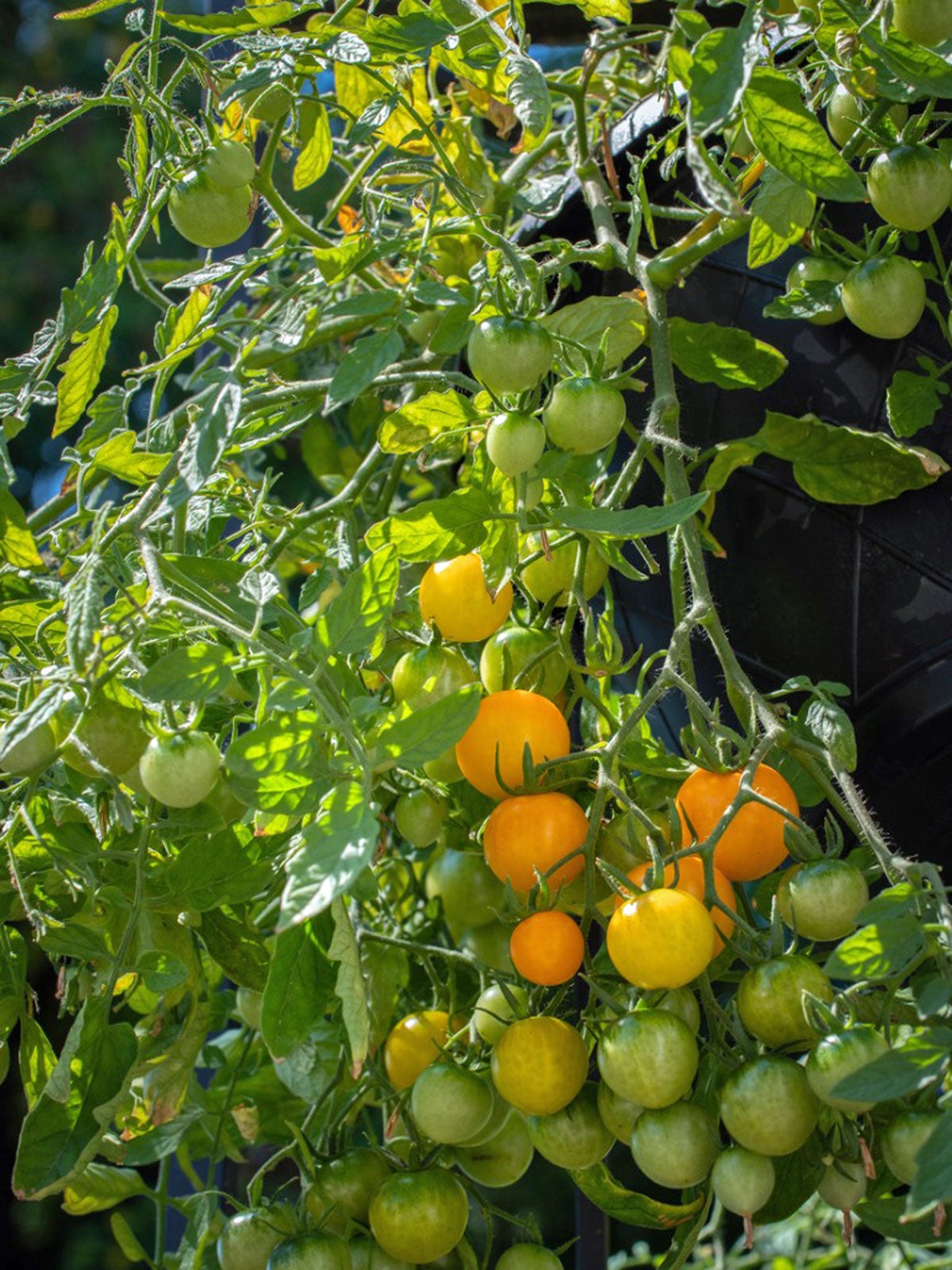Vegetables For Hanging Baskets: Growing Vegetables In A Hanging Basket


Space-saving fruits and vegetables have become so popular that a cottage industry has been built around planting solutions for small gardens. One easy way to garden in a small space is to grow vegetables for hanging baskets. Hanging vegetable plants, such as dwarf tomato varieties and snow peas, allow the space-challenged green thumb gardener the ability to provide his or her own organic produce. Mix herbs in with vegetables that grow in hanging baskets to provide a near complete meal in a container.
Types of Vegetables for Hanging Baskets
Vine crops and smaller vegetables work well in hanging baskets. Dwarf tomatoes, like cherry or grape, are perfect for the hanging container. Other fruits and vegetables that grow in hanging baskets are:
- lettuce
- strawberries
- peas
- small Asian eggplant
- some types of peppers
Keep in mind the light exposure where you will be hanging the planter. Tomatoes, eggplant, and peppers need high heat and levels of sunlight, while lettuce and spinach do better in lower light. Even the smaller vegetables need at least a gallon pot to grow well. There are upside down hanging planters that are designed for some tomatoes, peppers, and even green beans. They allow the plants to grow straight out of the bottom of the planter and prevent gravity from bending stems and minimizing the moisture and nutrients available to the fruit producing ends. For the price of some seed, there are numerous types of vegetables for hanging baskets to try. The best hanging basket vegetables are those that don't exceed the size of the planter by too much or can drape over the edge if they do exceed the diameter.
Planting Hanging Vegetable Baskets
Soil is one of the primary conditions for good healthy hanging planters. Make a mixture of peat, vermiculite, or perlite and compost.
- Peat offers light acidity and helps conserve moisture.
- Vermiculite or perlite, add to the complex texture of the soil and aid with drainage.
- Compost enhances the fertility of the mixture, aids in percolation, and helps keep weeds down.
Results will vary but most zones will be required to start plants in flats indoors six to eight weeks before the date of the last frost. Plants such as spinach and lettuce may be sown directly into the pot. You can also purchase starts and put them out when ambient temperatures are at least 65 degrees F. (18 C.) outside.
Growing Vegetables in a Hanging Basket
Hanging vegetable plants have the same needs as those in ground. The container needs excellent drainage, a stout hanging chain or other tether, nutrient rich clean soil, consistent moisture, protection from strong winds, and the correct lighting situation. The best hanging basket vegetables, such as cherry tomatoes or strawberries, need little more than these conditions but some plants will require staking, pinching, or tying up to help the plant adapt to a hanging planter. As with any plant that is productive, more flowering and fruiting will occur with regular feeding. Hanging vegetable plants perform well with a liquid fertilizer applied once per week at watering. Harvest fruit as they are ready and remove any broken stems or diseased plant material if it occurs. Hanging baskets need to be moved as the seasonal lighting changes for best production. Most plants will not overwinter but compost that old soil and plant for a good start the next year.
Gardening tips, videos, info and more delivered right to your inbox!
Sign up for the Gardening Know How newsletter today and receive a free copy of our e-book "How to Grow Delicious Tomatoes".

Bonnie Grant is a professional landscaper with a Certification in Urban Gardening. She has been gardening and writing for 15 years. A former professional chef, she has a passion for edible landscaping.
-
 Looking For Plants To Give You The Soft And Fuzzies? Try These 5 Fuzzy Leaf Plant Options
Looking For Plants To Give You The Soft And Fuzzies? Try These 5 Fuzzy Leaf Plant OptionsLovers of texture, drama, silver foliage and tactile plants will adore these special sensory garden additions. These fuzzy leaf plant options will leave you all aglow
By Susan Albert
-
 Get Ready For A Summer Of Hummers! Grow These Full Sun Hummingbird Plants and Flowers
Get Ready For A Summer Of Hummers! Grow These Full Sun Hummingbird Plants and FlowersIf you’re lucky enough to enjoy a sunny backyard, make sure you are maxing out on your pollinator opportunities and grow these full sun hummingbird plants and flowers
By Tonya Barnett